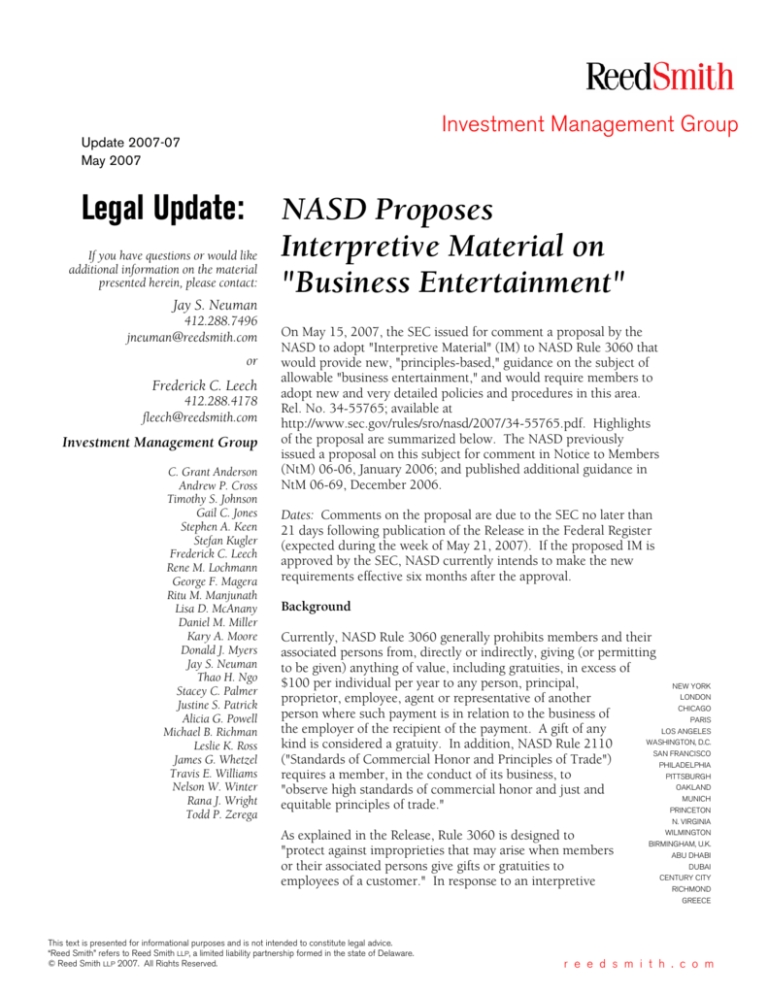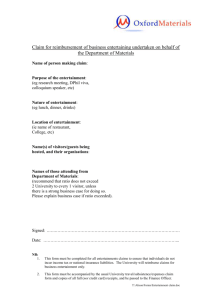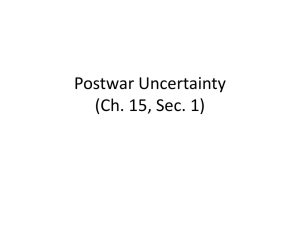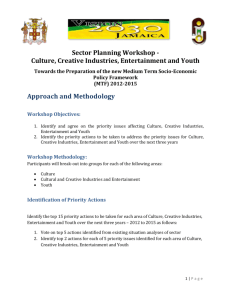
Investment Management Group
Update 2007-07
May 2007
Legal Update:
If you have questions or would like
additional information on the material
presented herein, please contact:
Jay S. Neuman
412.288.7496
jneuman@reedsmith.com
or
Frederick C. Leech
412.288.4178
fleech@reedsmith.com
Investment Management Group
C. Grant Anderson
Andrew P. Cross
Timothy S. Johnson
Gail C. Jones
Stephen A. Keen
Stefan Kugler
Frederick C. Leech
Rene M. Lochmann
George F. Magera
Ritu M. Manjunath
Lisa D. McAnany
Daniel M. Miller
Kary A. Moore
Donald J. Myers
Jay S. Neuman
Thao H. Ngo
Stacey C. Palmer
Justine S. Patrick
Alicia G. Powell
Michael B. Richman
Leslie K. Ross
James G. Whetzel
Travis E. Williams
Nelson W. Winter
Rana J. Wright
Todd P. Zerega
NASD Proposes
Interpretive Material on
"Business Entertainment"
On May 15, 2007, the SEC issued for comment a proposal by the
NASD to adopt "Interpretive Material" (IM) to NASD Rule 3060 that
would provide new, "principles-based," guidance on the subject of
allowable "business entertainment," and would require members to
adopt new and very detailed policies and procedures in this area.
Rel. No. 34-55765; available at
http://www.sec.gov/rules/sro/nasd/2007/34-55765.pdf. Highlights
of the proposal are summarized below. The NASD previously
issued a proposal on this subject for comment in Notice to Members
(NtM) 06-06, January 2006; and published additional guidance in
NtM 06-69, December 2006.
Dates: Comments on the proposal are due to the SEC no later than
21 days following publication of the Release in the Federal Register
(expected during the week of May 21, 2007). If the proposed IM is
approved by the SEC, NASD currently intends to make the new
requirements effective six months after the approval.
Background
Currently, NASD Rule 3060 generally prohibits members and their
associated persons from, directly or indirectly, giving (or permitting
to be given) anything of value, including gratuities, in excess of
$100 per individual per year to any person, principal,
NEW YORK
LONDON
proprietor, employee, agent or representative of another
CHICAGO
person where such payment is in relation to the business of
PARIS
the employer of the recipient of the payment. A gift of any
LOS ANGELES
WASHINGTON, D.C.
kind is considered a gratuity. In addition, NASD Rule 2110
SAN FRANCISCO
("Standards of Commercial Honor and Principles of Trade")
PHILADELPHIA
requires a member, in the conduct of its business, to
PITTSBURGH
OAKLAND
"observe high standards of commercial honor and just and
MUNICH
equitable principles of trade."
PRINCETON
As explained in the Release, Rule 3060 is designed to
"protect against improprieties that may arise when members
or their associated persons give gifts or gratuities to
employees of a customer." In response to an interpretive
This text is presented for informational purposes and is not intended to constitute legal advice.
“Reed Smith” refers to Reed Smith LLP, a limited liability partnership formed in the state of Delaware.
© Reed Smith LLP 2007. All Rights Reserved.
N. VIRGINIA
WILMINGTON
BIRMINGHAM, U.K.
ABU DHABI
DUBAI
CENTURY CITY
RICHMOND
GREECE
r e e d s m i t h . c o m
request, the NASD staff in 1999 issued a letter stating that Rule 3060
does not prohibit “ordinary and usual business entertainment” (such
as an occasional meal, sporting event, theater production or
comparable entertainment event), provided that such entertainment
is “neither so frequent nor so extensive as to raise any question of
propriety." This interpretive position was based in part upon NASD's
rules governing non-cash compensation in connection with the offer
and sale of investment company shares and variable annuities. Citing
recent reports and enforcement proceedings relating to what might
be seen as unusually excessive entertainment provided by certain
brokers to certain customer employees, NASD is proposing to add
the new IM to Rule 3060 to more explicitly address business
entertainment practices. The proposed IM would supersede any prior
guidance on this subject, including the 1999 letter referenced above.
The Proposed Interpretation
Reed Smith is a top-15 global
relationship law firm with more
than 1,500 lawyers in 21 offices
throughout the United States,
Europe and the Middle East.
Founded in 1877, the firm
represents leading international
businesses from Fortune 100
corporations to mid-market and
emerging enterprises. Its attorneys
provide litigation services in multijurisdictional matters and other high
stake disputes, deliver regulatory
counsel, and execute the full range
of strategic domestic and crossborder transactions. Reed Smith is a
preeminent advisor to industries
including financial services, life
sciences, health care, advertising
and media, shipping, international
trade and commodities, real estate,
and education. For more
information, visit reedsmith.com
The NASD's chief concern is that members and their associated
persons should not do or give anything of value to an employee of a
customer "that is intended or designed to cause, or would be
reasonably judged to have the likely effect of causing," such employee
to act in a manner that is inconsistent with the best interests of the
customer, or any person to whom the customer owes a fiduciary
duty. As stated in the Release, the guiding principle in addressing
this concern is that "members should compete for business on the
basis of providing the best professional services." Members are
cautioned that it is inconsistent with the terms of this interpretation
to use business entertainment to provide incentives to employees to
conduct customer business with and/or through the member without
due consideration as to whether the nature and terms of such
professional services meet the objectives and are in the best interests
of the account. The proposed IM builds directly on the requirement
of Rule 2110 to observe "high standards of commercial honor and
just and equitable principles of trade," and the Release notes that this
includes the obligation of a member not to act in a manner contrary
to the best interests of a customer in the conduct of business with or
for such customer.
•
Note: Although the focus of the proposal is on NASD members
that give or provide entertainment or gifts to employees of their
customers, one must keep in mind the fact that in these
situations, the recipients of the members' largesse may be subject
to a different set of regulatory constraints and duties (for
example, relevant provisions of the Investment Advisers Act of
1940).
General Requirement
The proposed IM would provide a general "principles-based"
standard, to the effect that no member or person associated with a
member shall, directly or indirectly, provide any "business
-2-
entertainment" to a "customer representative" pursuant to the
establishment of, or during the course of, a business relationship with
any "customer" that is intended or designed to cause, or would be
reasonably judged to have the likely effect of causing, such customer
representative to act in a manner that is inconsistent with: (1) the
best interests of the customer; or (2) the best interests of any person
to whom the customer owes a fiduciary duty.
Definitions
Under this formulation, the proposed IM would define the term
“customer” to mean:
(1) A person that maintains a business relationship with a
member via the maintenance of an account, through the conduct of
investment banking, or pursuant to other securities-related activity;
or
(2) A person whose customer representative receives business
entertainment for the purpose of encouraging such person to
establish a business relationship with the member by opening an
account with the member, or by conducting investment banking or
other securities-related activity with the member.
The term "customer representative" would be defined to mean a
person who is an employee, officer, director, or agent of a customer,
unless such person is a "family member" of the customer (as defined
in the proposed IM).
Reed Smith is a top-15 global
relationship law firm with more
than 1,500 lawyers in 21 offices
throughout the United States,
Europe and the Middle East.
Founded in 1877, the firm
represents leading international
businesses from Fortune 100
corporations to mid-market and
emerging enterprises. Its attorneys
provide litigation services in multijurisdictional matters and other high
stake disputes, deliver regulatory
counsel, and execute the full range
of strategic domestic and crossborder transactions. Reed Smith is a
preeminent advisor to industries
including financial services, life
sciences, health care, advertising
and media, shipping, international
trade and commodities, real estate,
and education. For more
information, visit reedsmith.com
Although the Release notes that this definition would recognize a
distinction between business entertainment provided directly to
"natural person customers" (which is not covered by Rule 3060) and
business entertainment provided to employees, agents or
representatives of a customer (which is covered by Rule 3060), it also
cautions that members cannot circumvent the proposal by providing
business entertainment to a natural person customer who also is an
employee, agent or representative of a customer, by claiming that
such business entertainment applies only to the "natural person"
relationship.
The term "business entertainment" would be defined to mean any
social event, hospitality event, sporting event, entertainment event,
meal, leisure activity, or event of like nature or purpose (including
business entertainment offered in connection with a charitable event,
educational event or business conference), as well as any
transportation or lodging related to such activity or event, in which
an associated person of a member accompanies a customer
representative.
Note that, if a customer representative is not accompanied by an
appropriate associated person of the member, any expenses
associated with the business entertainment will be considered a "gift"
under Rule 3060 unless "exigent circumstances" make it impractical
-3-
for an associated person of the member to attend, and such
circumstances are handled under special procedures and are
"thoroughly documented." Anything of value given or provided to a
customer representative that does not fall within the definition of
"business entertainment" is a gift under Rule 3060. The Release notes
that this approach codifies NASD's "longstanding position" that a
member must accompany or participate in an event for it to be
deemed business entertainment. Thus, for example, if a member
gives tickets to a sporting event but does not accompany the recipient
to the event, the tickets are deemed to be a gift rather than business
entertainment.
Written Policies and Procedures
The proposed IM would also require members to have certain specific
written policies and procedures to govern business entertainment
activities. Members are cautioned in this regard (with perhaps
unintended irony) that they would violate the proposed
interpretation not only if they failed to adopt such procedures, but
also "if the procedures set standards that are so unbounded or vague
that no reasonable determination of propriety can be discerned." As
proposed, members must have policies and procedures that:
•
Reed Smith is a top-15 global
relationship law firm with more
than 1,500 lawyers in 21 offices
throughout the United States,
Europe and the Middle East.
Founded in 1877, the firm
represents leading international
businesses from Fortune 100
corporations to mid-market and
emerging enterprises. Its attorneys
provide litigation services in multijurisdictional matters and other high
stake disputes, deliver regulatory
counsel, and execute the full range
of strategic domestic and crossborder transactions. Reed Smith is a
preeminent advisor to industries
including financial services, life
sciences, health care, advertising
and media, shipping, international
trade and commodities, real estate,
and education. For more
information, visit reedsmith.com
•
•
•
•
•
Define forms of business entertainment that are appropriate and
inappropriate using quantitative and/or qualitative standards that
address the nature and frequency of the entertainment provided,
as well as the type and class of any accommodations or
transportation provided in connection with such business
entertainment
Make clear that anything of value given or otherwise provided to
a customer representative that does not fall within the definition
of "business entertainment" is a gift under Rule 3060
Impose specific dollar limits on business entertainment or require
advance written supervisory approval beyond specified dollar
thresholds
Are designed to detect and prevent business entertainment that is
intended as, or could reasonably be perceived to be intended as,
an improper quid pro quo or that could otherwise give rise to a
potential conflict of interest or undermine the performance of a
customer representative’s duty to a customer or any person to
whom the customer owes a fiduciary duty
Establish standards to ensure that persons designated to
supervise and administer the written policies and procedures are
sufficiently qualified
Require appropriate training and education for all personnel who
supervise, administer, or are subject to the written policies and
procedures
The policies and procedures should be "reasonably designed to
preclude providing business entertainment that is so lavish or
-4-
extensive in nature that an employee would likely feel compelled to
place order flow on behalf of the customer without due regard to best
execution or other transaction pricing considerations." The proposed
IM would also specify that, in valuing business entertainment
expenses pursuant to this interpretation, a member’s written policies
and procedures must specify the methodology to be used by the
member to calculate the value of business entertainment. "In general,
business entertainment expenses should be valued at the higher of
face value or cost to the member."
The proposed IM also would allow, but not require, members to
establish different standards for business entertainment in connection
with events that are educational, charitable, or philanthropic in
nature. However, if a member chooses to do so, it should ensure that
these types of business entertainment nonetheless comply with Rule
2110 and the general requirements of the proposed IM.
Supervision
The proposed IM stresses that "supervision is a critical component of
entertainment policies and procedures." Members are free to define
the approach and method of their written policies and procedures,
provided they are reasonably designed to comport with the principles
stated in the interpretation. In all cases, "it must be clear from the
supervisory policies and procedures what factors determine
appropriate levels of business entertainment and how those
determinations are executed, monitored, and enforced."
Reed Smith is a top-15 global
relationship law firm with more
than 1,500 lawyers in 21 offices
throughout the United States,
Europe and the Middle East.
Founded in 1877, the firm
represents leading international
businesses from Fortune 100
corporations to mid-market and
emerging enterprises. Its attorneys
provide litigation services in multijurisdictional matters and other high
stake disputes, deliver regulatory
counsel, and execute the full range
of strategic domestic and crossborder transactions. Reed Smith is a
preeminent advisor to industries
including financial services, life
sciences, health care, advertising
and media, shipping, international
trade and commodities, real estate,
and education. For more
information, visit reedsmith.com
In addition, such supervisory procedures should provide a method
for evidencing both the breadth of supervisory activities as well as the
information upon which such supervision is conducted. For
example, a member’s policies and procedures must evidence the basis
upon which a supervisor will determine that business entertainment
does not violate a member’s standards as to the nature, frequency,
and/or dollar amounts of entertainment. A member's policies and
procedures must establish standards to ensure that persons
designated to supervise and administer the member's written policies
and procedures are "sufficiently qualified," i.e., that they are familiar
with the applicable regulatory requirements and are sufficiently
senior and experienced to entrust with the approval obligations
envisioned by the member's policies and procedures. As always, the
member must provide for appropriate training and education on the
policies and procedures, and periodically review them to determine if
they continue to be practicable and fulfill their purpose.
Recordkeeping
The written policies and procedures must require the maintenance of
detailed records of business entertainment expenses provided to any
customer representative. The member is not required to maintain
records of business entertainment when the total value of the
-5-
business entertainment, including all expenses associated with the
business entertainment, does not exceed $50 per day; or additional
expenses incurred in connection with otherwise recorded business
entertainment that do not, in the aggregate, exceed $50 per day. The
policies and procedures must include "provisions reasonably
designed to prevent associated persons of the member from
circumventing the recordkeeping requirements in contravention of
the spirit and purpose of this interpretation" (e.g., a pattern of
providing a customer representative with business entertainment
valued at $48). Finally, the policies and procedures must require
that, upon a customer’s written request, the member will promptly
make available to the customer any records regarding business
entertainment provided to customer representatives of that customer.
*****
Reed Smith is a top-15 global
relationship law firm with more
than 1,500 lawyers in 21 offices
throughout the United States,
Europe and the Middle East.
Founded in 1877, the firm
represents leading international
businesses from Fortune 100
corporations to mid-market and
emerging enterprises. Its attorneys
provide litigation services in multijurisdictional matters and other high
stake disputes, deliver regulatory
counsel, and execute the full range
of strategic domestic and crossborder transactions. Reed Smith is a
preeminent advisor to industries
including financial services, life
sciences, health care, advertising
and media, shipping, international
trade and commodities, real estate,
and education. For more
information, visit reedsmith.com
-6-








